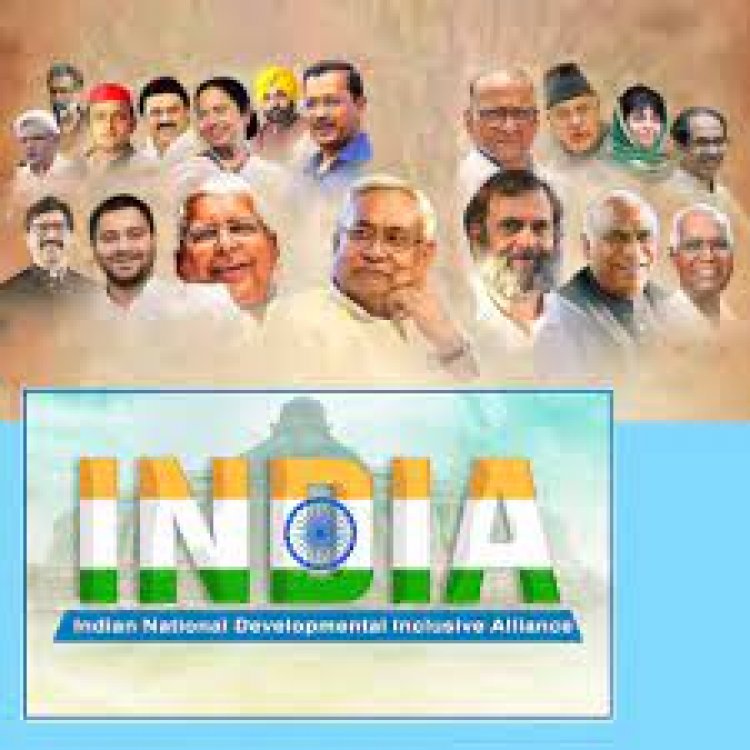Opposition India Alliance: September Deadline for Seat-Sharing Plan
Asia News Agency

On the first day of their 2 day meeting, leaders of the INDIA Opposition bloc, in their meeting Mumbai Thursday, set for themselves a deadline of September 30 to finalise their state-wise seat-sharing arrangement so that the bloc can effectively take its campaign down to the voters in the run-up to the Lok Sabha polls.
The top brass of the 28 Opposition parties also agreed on the need to draw up its common minimum programme and the final list of issues for campaign at the Mumbai edition of the bloc’s conclave without further delay.
These were among the main decisions taken during hectic parleys at the informal sitting of the top brass of the 28 Opposition parties
Extensive discussions were also held Thursday on the suddenly announced special session of Parliament and over fervent media speculations on whether the government plans to introduce the one-nation-one-election Bill in that session.
Challenges for INDIA
INDIA’s meeting in Mumbai is being seen with interest. The not-so-easy-to-play chessboard of the 2024 Lok Sabha election, writes Sheela Bhatt (Delhi-based senior journalist) “is spread before INDIA’s highly successful and politically savvy leaders — Sharad Pawar, Sonia Gandhi, Mamata Banerjee, Nitish Kumar, MK Stalin and others. The BJP isn’t foolish to ignore their congregation. The significant reduction in the price of gas cylinders seems to be a starter. The framework under which the 2024 election will be fought is in the making. The parameters that are influencing it have been developing since 2014.”
Consolidation of Hindu vote: It’s clear that over the past nine years, “a big shift has taken place in India’s electoral politics — the ‘consolidation’ of Hindu votes. In 2014, PM Modi and his deputy Amit Shah arrived from Gujarat with the tag of “nationalist Hindus”. They were considered bolder than the Vajpayee-Advani duo.
But, if you look back at the past nine years from the RSS-BJP’s perspective, they have gotten a bigger political crop than they imagined. In Uttar Pradesh, the use of bulldozers to target accused belonging to the minority community is unparalleled in Indian public life. No political party has been able to oppose it with the fury and force it deserves. It speaks to the change in Indian electoral politics.
“The RSS was founded in 1925, but until 2014 Indian voters did not believe in its ideology as openly and without inhibitions as they do now. This is the first fundamental issue that will influence the 2024 election.
“Two, PM Modi has not once made an error in solidifying a permanent core Hindu vote base.
“The modernisation and upkeep of Hindu religious infrastructure is a visible action. His persona that imbibes development and Hindutva, which helped BJP win the 2014 and 2019 elections, has not been diluted in these nine years. The Opposition has failed to dent his image as a nationalist Hindu. This is the biggest challenge on the table at the conclave of INDIA leaders in Mumbai.”
Out of India’s 543 Lok Sabha seats, BJP has a clear advantage on around 100 seats due to the past nine years of BJP rule solidifying Hindu votes.
Convincing prime ministerial candidate: Winning elections against Modi won’t be easy without projecting a convincing prime ministerial candidate. Already, supporters of Rahul Gandhi, Nitish Kumar, Arvind Kejriwal, Sharad Pawar, and Mamata Banerjee have claimed how their leader is best suited to be a PM candidate.
Sources claim that INDIA coalition’s top brass may, eventually, agree to bring in an ‘apolitical’ professional who will have characteristics similar to Manmohan Singh, as a PM candidate. That would cool down all the parties’ ambitions.
However, Bhatt states “consensus is a must within the INDIA fold for any such neutral personality, without a mass base and with the experience of running a government institution, to be nominated. The nominated person must be clever enough to prove that they are not a threat to anyone within INDIA.”
Chemistry more important than arithmetic
A bigger challenge for the Opposition is chemistry, or the lack of it On paper, the INDIA (the Indian National Developmental, Inclusive Alliance) front appears to have arithmetic on its side, but its chemistry is questionable. Without getting its chemistry right, Omkar Poojari (political researcher and columnist) writes “INDIA would find it difficult to take on the might of the Bharatiya Janata Party’s (BJP) formidable election machinery that derives its strength from Narendra Modi’s charisma and chemistry…..
“There are two aspects of the chemistry of such alliances: chemistry between the alliance partners as well as the alliance’s appeal and perception among the voters. To get its chemistry right, INDIA would have to work on both these aspects.”
BJP better placed in terms of chemistry: INDIA has many parties which are engaged in direct political contests or have a history of hostilities. “The chemistry between the alliance partners depends on the level of animosity between the supporters and voters of these parties which is a product of their past rivalries. Higher animosity between two parties would mean poor chemistry between the parties, resulting in a lower vote transfer as supporters of these parties would be reluctant to vote for a former foe turned ally….”
In contrast, over the years, the Narendra Modi-led BJP has “deepened its chemistry with voters through Mr. Modi’s personal charisma and a slew of welfare measures among other things.”
















